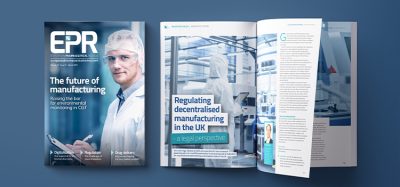European PFAS restriction could jeopardise pharmaceutical manufacturing
Posted: 28 September 2023 | Catherine Eckford (European Pharmaceutical Review) | No comments yet
Pharmaceutical manufacturing in Europe is at risk of critical medicine shortages, states the European Federation of Pharmaceutical Industries and Associations (EFPIA), if the widest chemical substance restriction, concerning Per- and Polyfluoroalkyl Substances (PFAS), is put in place.


According to the European Federation of Pharmaceutical Industries and Associations (EFPIA), more than 600 essential medicines are at risk if a proposed restriction on the use of fluorinated substances, per- and polyfluoroalkyl substances (PFAS) across pharmaceutical manufacturing in the EEA, is implemented.
A total ban [of PFAS] would see medicines’ manufacturing in the EU grind to a halt in under three years”
EFPIA stated that the EU chemical legislation under The Regulation on the registration, evaluation, authorisation and restriction of chemicals (REACH) from the Competent Authorities (CAs) of Germany, the Netherlands, Sweden, Denmark and Norway, Europe would be the widest ever put in place; restricting the manufacture, marketing and use of up to 10,000 (PFAS) substances.
“While we support the need to restrict certain PFAS, we need to find the right approach to ensure the continued manufacturing and availability of medicines in Europe. A total ban would see medicines’ manufacturing in the EU grind to a halt in under three years. It would also jeopardise the production of all pharmaceutical substances in Europe and would be in conflict with the EU’s strategy of reducing dependency on nations outside of the EEA in the event of shortages or pandemics,” Nathalie Moll, Director General, EFPIA commented.
PFAS restriction in pharmaceutical manufacturing
In its current form, the procedure currently underway could lead to a ban on all PFASs by 2027, with very limited derogations, EFPIA acknowledged.
The pharmaceutical industry is concerned about the environmental impact of PFAS of certain harmful PFAS. However, not all PFAS have the same hazardous properties with some considered of low concern by the Organisation for Economic Co-operation and Development (OECD), EFPIA noted.
PFAS are used throughout the production process of medicines. EFPIA highlighted that the legislation would apply to packaging materials using fluoropolymers, or combination products such as pre-filled syringes. However, the presence of PFAS in a final medicinal product have no or low identified risk, in terms of through medicine risk benefit or environmental risk assessments, the organisation stated.
EFPIA’s response
In its sector response to the European Chemicals Agency (ECHA) open consultation earlier this week, EFPIA’s informed ECHA and the Commission of the potential impact of the PFAS restriction on medicinal product supply chains.
The organisation’s response included results from a patient impact analysis. According to EFPIA, if the proposals go ahead in their current form:
- At least 47,677 global marketing authorisations are at risk of being affected; a significant number of critical medicines would no longer be available
- Over 600 medicines from the WHO Essential Medicines List are at risk
- The European Member State’s “Critical Medicines lists” would be greatly impacted. For example, 78 percent of the critical medicines list in Norway could be impacted by the proposed restriction; in Finland 74 percent; Sweden 73 percent; France 72 percent; and Germany 60 percent.
Additional socio-economic assessment concluded that:
- Without additional derogations, the pharmaceutical industry would no longer be able to manufacture active pharmaceutical ingredients (APIs) or associated medicinal products in the EEA
- If medicine shortages come about as a result of the limited capacity of affected medicines, the PFAS restriction would impact European competitiveness
- The replacement of PFAS is limited by availability, technical applicability, and environmental trade-offs of alternatives which are to date not (readily) available.
In its Annex 3 on the industrial use of certain PFAS in pharmaceutical manufacturing, ISPE and EFPIA stressed that the greatest impact of the restriction on PFAS would be “additional drug product unavailability due to product temporary or definitive disruption.”
Related topics
Big Pharma, Biopharmaceuticals, business news, Distribution & Logistics, Drug Development, Drug Manufacturing, Drug Markets, Drug Supply Chain, Industry Insight, Manufacturing, Regulation & Legislation, Research & Development (R&D), Therapeutics
Related organisations
European Federation of Pharmaceutical Industries and Associations (EFPIA), International Society for Pharmaceutical Engineering (ISPE)









